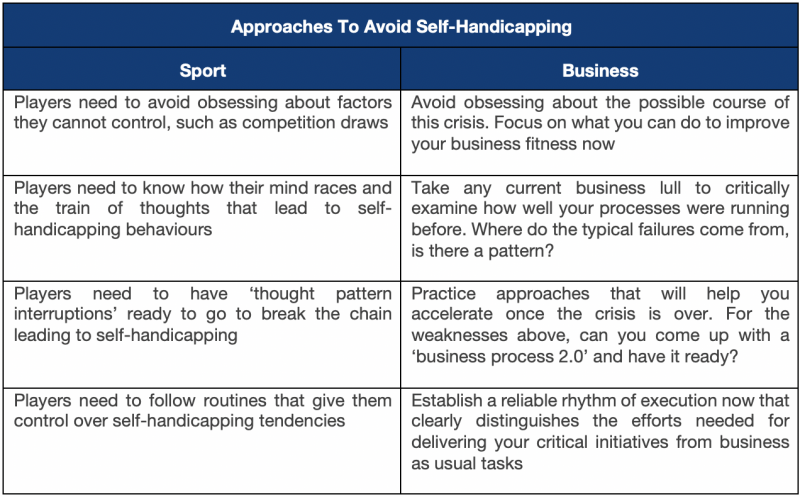Don’t Handicap Your Business
Coming Out Of This Crisis Fitter Than Ever ...And When To Start Working On Your Ability To Execute?
In elite sport, there is a less-talked about, but well-researched, phenomenon called ‘self-handicapping’. Even those whose life and support setup is entirely dedicated to peak performance are shown to resort to using external excuses (such as injury), to exaggerate the impact on their performance far more often than one would assume likely. With many competitors’ worlds falling apart now with the cancellation of the 2020 Olympics and other global sporting events (a perfect reason to justify potential poor individual performances to come), what can business learn from this phenomenon?
What is Self-Handicapping?
Self-handicapping in sport is believed to originate from athletes’ tendency to externalise failure and internalise success. As such, it protects competitors from possible future days of reckoning, to allow them to maintain their personal perceptions of competence, or protect and enhance their public image. It consists of thoughts, statements and behaviours in advance of an event that will frame and measure their performance, that increase the chances of the situation being blamed for poor performance, or personal factors being credited for good performance.
Tennis is a sport where the mentality of players is very much visible and much of the dramatic behaviours of well-known stars could be attributed to self-handicapping strategies. Complaints about crowd distractions, calling the trainer, arguing with the referee, often when the consequence of docked points is very predictable, are all possible examples that coaches and sports psychologist work to help players eliminate.
The Temptation To ‘Sandbag’
If we assume that this behavioural strategy could occur in other settings, it does not take a great leap of imagination to consider this in the light of the current COVID-19 crisis. Which businesses could ‘sandbag’ and attribute a multitude of already developing weaknesses in executing their 2020 plans to the unfolding external situation?
And internally, which teams will ‘come off their numbers’ without making a critical examination of underlying structural weaknesses that were already making achieving them a struggle? Does everyone have a free pass now?
It may well be harsh to expect delivery as usual in the current situation and of course allowances will need to be made. But, it is vital to distinguish between this external impact, and factors that were already in play, and that may return to handicap a team or business once the external crisis is over. If the crisis allows them to be overlooked, by the time the business is trying to return to full fitness, it will be too late for many.
Four Approaches
Here we have listed four approaches used by sportspeople to overcome self-handicapping, and a corresponding business approach to help come out of these unforeseen external circumstances strongly, notwithstanding the inevitable impact:

Summary
If you can take the opportunity of a crisis to be critical about your performance to date, rather than giving out a free pass, gains that you make in building your ability to execute your strategy during the current testing times, will give you a head start as this comes to an end. In business, there will be no referee to complain to, or trainer to call on. There is nowhere to hide!
